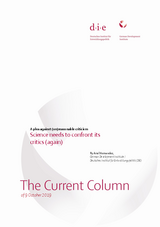The Current Column
A plea against (un)reasonable criticism
Science needs to confront its critics (again)
Hernandez, ArielThe Current Column (2019)
Bonn: German Development Institute / Deutsches Institut für Entwicklungspolitik (DIE), (The Current Column of 9 October 2019)
Bonn, 9 October 2019. Scientific knowledge, as the pillar of evidence-based policy-making, is currently on the defensive. Healthy scepticism alone cannot justify the newly emerged “anti-scienceism” and “anti-intellectualism”. Anti-science sentiment has gained alarming societal traction. Climate change deniers, anti-vaccine activists and even believers of the earth being flat complement their fabrications with “alternative facts” and attacks on science and academia. At the same time, members of scientific communities seem to be reluctant to engage in public debate to defend themselves. In doing so – the argument usually goes – they would not only award legitimacy to the anti-science movement, but also inevitably “normalise” anti-intellectualism. This reluctance is not helpful in defending science and is even reinforcing the risks. Two examples: In the first two months of 2019, a record-breaking 8,443 cases of measles and more than 130 deaths were reported in the Philippines. The outbreaks were attributed to fears about vaccination that has been instigated by misinformation. In Brazil the new government froze 43 percent of the budget of the science and communications ministry, cut off 30 percent of the funds given to federal universities and suspended more than 80,000 scholarships to young researchers. The first example highlights the direct threats to human lives through the distrust against vaccination. The second case is an example of how a country’s capacity to produce knowledge is reduced and its future gravely undermined. The anti-science movement presents four main arguments to attack science. These criticisms touch on a sore spot that relates to the social mandate of science. Scientists must learn how to respond to the simple and snappy charges of the anti-science movements that are highly effective in stirring distrust in the public. The following is a cross-examination of these charges: Charge 1: Science has dogmas with no room for deliberation. Scientists should be able to explain the prerequisites of high quality scientific work. Science is itself dependent on various stages of deliberation and exchanges of perspectives. Science does not offer facts in dogmatic terms, because scientific outputs are themselves results of a process: theoretical reflection, exchange of perspectives and empirical research. Dogmas are static, while scientific knowledge is incremental and itself a result of long consensus-building processes. In addition, academic and professional experts should be transparent that when they engage in political discourse, they need to clearly draw the line between what is political and what is scientific. Charge 2: Scientists are biased. Experiences are imperatives of each human’s value system. Scientists should not be afraid to admit that they are themselves humans with value systems. However, they should be able to guarantee that these value systems do not influence the results of scientific works. To ensure this, there are existing scientific method and rules. Scientists as well as publishers should commit to these rules and establish credible verification. Charge 3: Scientists are incapable of providing useful solutions. Scientists are often portrayed as oracles that do not give concrete solutions. While scientists can give policy-relevant inputs such as different scenarios or the cost-benefit of policies, they should clearly communicate that complex problems entail complex solutions and that it is not the social mandate of scientists to decide on policies. The solutions themselves require appropriation of values which is not done by scientists but by policy-makers. Scientists should loudly and clearly disclaim when their scientific outputs are abused by “shopping” political actors. Charge 4: Scientists preach to save the planet and yet they fly to conferences abroad emitting tons of emissions. Scientists attend conferences to exchange ideas, present research results, correct errors through peers, identify bias in the methods, and network to improve the impact of their research. Conferences are important to high quality research. Nevertheless, scientists should reflect whether they merely engage in “academic tourism” or whether the value or impact of their attendance in conferences or of their field research abroad is enough to justify or even off-set the environmental impact of such travels. What is our case? (Un)reasonable ignorance can beat science, not because the latter is unable to provide useful answers. The reason is that unlike truth and logic, the basic pillars of science, ignorance does not need to be consistent nor adhere to its own criticisms. It does not need to be objective, reliable nor verifiable. It does not even need citation of sources, anti-plagiarism tools, nor accountability. We scientists need not only to bring the case back to the facts, but also make the facts sexy. How? By throwing a light on its primordial purpose – namely to advance human well-being.


